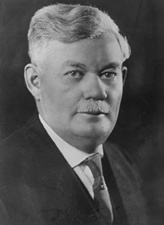John G. Townsend, Jr.
| John G. Townsend Jr. | |
|---|---|
 |
|
|
United States Senator from Delaware |
|
|
In office March 4, 1929 – January 3, 1941 |
|
| Preceded by | Thomas F. Bayard Jr. |
| Succeeded by | James M. Tunnell |
| 55th Governor of Delaware | |
|
In office January 16, 1917 – January 18, 1921 |
|
| Lieutenant | Lewis T. Eliason |
| Preceded by | Charles R. Miller |
| Succeeded by | William D. Denney |
| Member of the Delaware House of Representatives | |
|
In office January 13, 1903 - January 10, 1905 |
|
| Personal details | |
| Born |
May 31, 1871 Worcester County, Maryland |
| Died | April 10, 1964 (aged 92) Philadelphia, Pennsylvania |
| Political party | Republican |
| Spouse(s) | Jennie Collins |
| Residence | Selbyville, Delaware |
| Occupation | businessman |
| Religion | Methodist |
John Gillis Townsend Jr. (May 31, 1871 – April 10, 1964) was an American businessman and politician from Selbyville in Sussex County, Delaware. He was a member of the Republican Party, who served as Governor and two terms as U. S. Senator from Delaware.
Townsend was born at Bishopville, in Worcester County, Maryland, son of John Gillis Sr. and Mariedith Dukes Townsend. He married Jennie Collins, and they had seven children, John G. III, Jennie Thelma, Paul, Julia, Preston Coleman, Edith, and Lyla. His wife was killed in an automobile accident while he was Governor. They were members of the Methodist Church.
When the railroad first came through Bishopville, Townsend learned telegraphy and was hired by the Pennsylvania Railroad. Soon he realized the need for railroad ties, set up a saw mill to make them, and began selling them. In 1896 he moved his family to Selbyville, Delaware, where he began growing strawberries. Before long he was known as the "Strawberry King." To better manage his business he set up his own bank, the Baltimore Trust Company, at the time the second largest bank in the state. Moving into poultry, corn and soybeans, by the time of his death, Townsend, Inc. grew into one of the largest, most diversified agricultural businesses in Delaware. He continued his businesses after entering politics and returned to their management when he was not in office.
Townsend was elected to the Delaware House of Representatives and served one term during the 1903-04 session as a member of the Addicks, or Union Republican, faction of the Republican Party. He was elected Governor of Delaware in 1916 by defeating Democrat James H. Hughes, a lawyer from Dover, Delaware.
Townsend was elected to the U.S. Senate in 1928, defeating incumbent Democratic U.S. Senator Thomas F. Bayard Jr. and was reelected in 1934, defeating former Democratic U.S. Representative Wilbur L. Adams. Townsend lost his bid for a third term in 1940 to Democrat James M. Tunnell, a lawyer from Georgetown, Delaware.
In the 72nd Congress he was Chairman of the Committee to Audit and Control the Contingent Expenses. He was also a member of the Mount Rushmore National Memorial Commission in 1939 and 1940.
Townsend died at age 92, while at Philadelphia, and is buried in the Red Men's Cemetery at Selbyville.
"Townsend's administration was one of progressiveness and reform...all the major reforms of the 19th century came to maturity during this time: woman suffrage, new and better highways, prohibition, school reform, etc..."
...
Wikipedia
